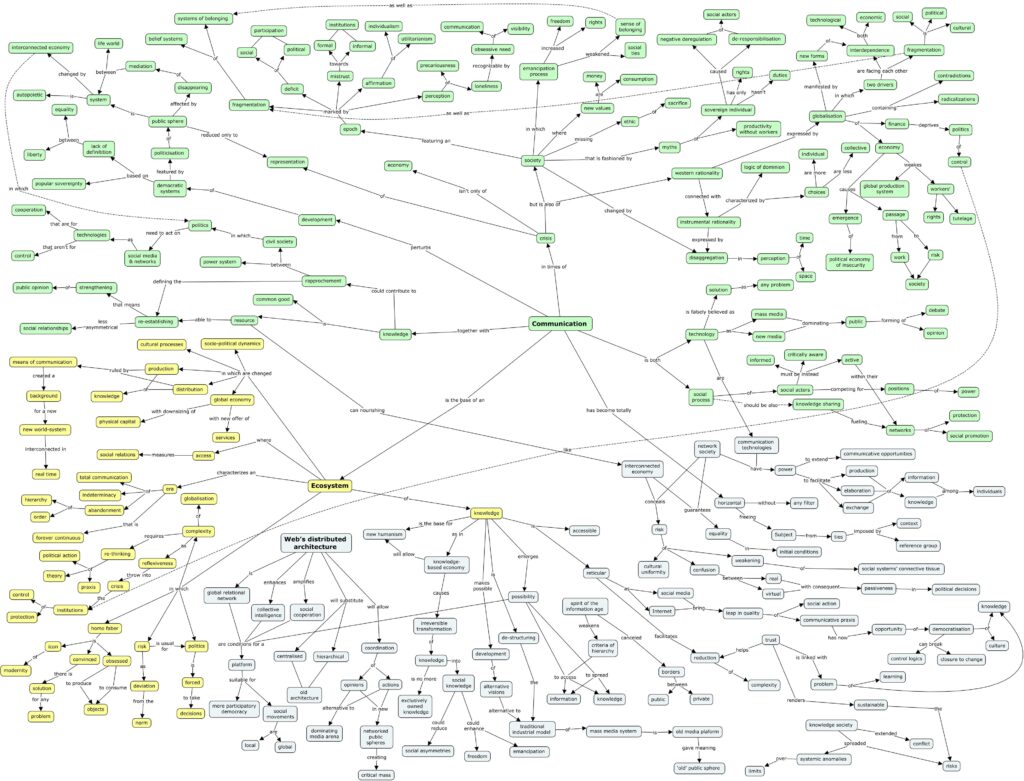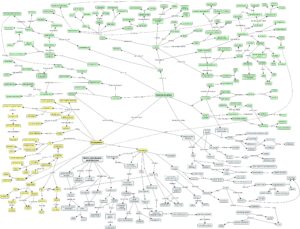Concept Map developed by Massimo Conte,
Instructional Designer, with Cmap Tools. Click on the picture above to zoom it.
Interactive concepts network of article: http://onodo.org/visualizations/17020/
Technological innovation is one of the determining variables of the evolution of social systems and organizations, but it is not sufficient in and of itself. Once more, what is needed is culture, shared knowledge and education to allow systems to metabolize change and to efficiently manage the out-of-control phases that accompany the accelerations imposed by technology, which – it must not be forgotten – is always a product of culture and never something “external”
P.D.(1998).
The current chaotic and disordered social systems are undergoing a (critical) phase of change marked by the advent of an interconnected economy, an economy which is calling to attention certain questions regarding the issue of citizenship. Under discussion are the new opportunities for emancipation offered by the widespread knowledge which is fuelling the networks of protection and social promotion. The links of interdependence and interconnection are intensifying, even if some observers continue to hypothesize the possible end of the social bond. The old industrial model consisting of consolidated orders, hierarchies, logics of control and closure to change seems on the point of being broken by the new knowledge ecosystem. On the other hand, we are living in an age increasingly marked by the fragmentation of the systems of belonging and belief – the real producers of individual and collective identity ‒ and by the consequent affirmation of individual and utilitarian values. This is a sort of “tyranny of the individual” which presents itself as a real centrifugal force capable of corroding the ties within the social system and thus testing their resilience. This process of progressive weakening and flaking away finds further confirmation in the widespread deficit of social and political participation, which is itself fuelled by a climate of general mistrust towards all the (formal and informal) institutions that used to be the sole agencies responsible for the transmission of value and knowledge guidance systems. The thesis that we shall therefore seek to discuss is the following: the individualism dominant in our social systems is the result – to some extent the inevitable result ‒ of a process/project of emancipation that has been brought forward in the course of modernity. This process of emancipation, first of the masses, then of the Subject, has, on the one hand, increased the spheres of freedom and led to the recognition of certain fundamental rights (at least on a theoretical level); on the other hand, it has contributed to the weakening of the ties and bonds of belonging to a Community.
Keywords
Modernity; social bond; resilience; emancipation; individualism; communication, social production of knowledge.
In this complex modern age, social systems appear to be increasingly characterised by conflictual dynamics and a limited rationality which leave every dialectic open and unresolved. In such a context, communication ‒ here taken to mean a social process of knowledge sharing ‒ seems to have taken on a strategic central role in every area of the praxis. The hypertrophic growth of the bureaucracy, the progressive dissolution of pub- lic space and the evolution of democracies founded on transparency, access, the concept of popular sovereignty and, from a cultural point of view, economic individualism ‒ at the expense of democratic individualism [1]‒ have caused a radical politicisation of the public sphere, whose operating space has been significantly reduced to the single issue of ‘representation’ and to serve the power system. This is the development process of newborn democratic systems, which are often culturally based on the concept of popular sovereignty ‒ taken here to mean the hegemony or predominance of the majority ‒ and on the lack of a definition of the relationship between the founding values of liberty and equality. The public sphere, which expresses itself through political institutions and new social issues seeking public recognition and translation into laws, has continued to formulate itself as an autopoietic system. Given that, and to echo Habermas [2], the level of mediation between the system and the life world has disappeared, a mediation based on a communicative act capable of critically addressing social issues and opinions produced in the life world and civil society, and thereby fully legitimising them and rendering them publically relevant. The current social systems, as chaotic and disordered as they are, are passing through a further (critical) phase of change, a change marked by the advent of the interconnected economy, which itself raises further questions about citizenship. The objects of discussion are now the new opportunities for emancipation created by the widespread knowledge which fuels the networks of protection and social promotion.
The ties of interdependence and interconnectivity are intensifying, even if some observers continue to hypothesize the possible end of the social bond. It’s worth highlighting here the interesting growth of social movements and pressure groups which no longer feel represented by the increasingly distant political sphere, and are therefore taking on the responsibility for making social issues generated from below visible to the Sovereign, and to public opinion. The old industrial model of consolidated structures, hierarchies, control logics and closure to change seems on the point of being broken up by a new knowledge ecosystem [3]. Knowledge is (finally) beginning to be (further) recognised as a common good and a resource capable of (re-) establishing less asymmetrical social relationships. But, and it’s worth reiterating here, the new forms of the social production of knowledge will only become decisive if the actors in the public arena know what to do with the knowledge, the networks, the social media, and, more generally, the technology. And it’s for this reason that the need for a total reform of (complex) thought and knowledge becomes urgent. In any case, we are living in an epoch increasingly marked by the fragmentation of belief systems and systems of belonging ‒ the real producers of individual and collective identities ‒ and by the consequent affirmation of individual and utilitarian values. It’s no coincidence that there has been much debate on ‘the tyranny of the individual’, a full-blown centrifugal force capable of corroding the ties within the social systems and thus testing their resilience.
This process of progressive weakening and flaking away finds further confirmation in the widespread deficit of social and political participation, which is itself fuelled by a climate of general mistrust towards all the (formal and informal) institutions that used to be the sole agencies responsible for the transmission of value and knowledge guidance systems. This extremely complex and difficult-to-read scenario, coming in the wake of politics’ loss of credibility and authority, leaves the field open to the possibility of a ‘post party’ democracy, given that the parties are no longer capable of maintaining the consensus and mediating between the new forms of conflict. Forming the background to this is a crisis of the very idea of the party [4] which one can add to the much deeper crisis of representation. The dominant individualism of our social systems is the result ‒ to some degree the inevitable result ‒ of the emancipation process/project that has been brought forward throughout modernity. This process of emancipating first the masses, and then the Subject, has, on the one hand, brought about an increase in areas of freedom and a recognition of certain fundamental rights (at least in theory). On the other hand, it has contributed to the weakening of the ties and sense of belonging to the Community. Paradoxically in an age apparently marked by greater opportunity for emancipation and extraordinary potential for communication ‒ even if, in my opinion, communication and connection are often confused ‒ the triumph of the Subject who is both ‘free of’ and ‘free from’ has determined an unravelling of the social fabric, in that the fabric is made up of people increasingly left alone to face such complexities.
The contemporary age is one in which the social mechanisms of trust and cooperation ‒ a supporting structure, along with economic and power relations ‒ have also been sorely tested by the processes of precariousness which have rendered instability an existential condition. In conclusion, the hypothesis of this paper is this: beyond the profound economic crisis (whose roots are far from being exclusively economic!), the phase we are living through is particularly dramatic. People clearly feel the risk of the ‘end of the social bond’, and this perception (both on an individual and collective scale) counts, along with a feeling of being alone in facing the insecurity and precariousness of life. I’d add here that one can also recognise this drama of solitude ‒ which is also a void of sense, a difficulty in giving reality meaning ‒ in the obsessive need to communicate and be ‘visible’ at all costs (old and new media), so as not to be forgotten (a question of identity and recognition). In this complex, uncertain and multifaceted scenario, communication, the means of communication (mass and new media), information systems, the Internet, and, in particular, Web 2.0, appear to have definitively occupied ‒ not to say dominated ‒ the public space of debate and the forming of public opinion, as well as that decisive area of social prax is formerly controlled by the traditional agencies of socialisation. On this subject, it’s of fundamental importance to keep the two levels of discourse and analysis separated: on the one hand, technology and/or the means of communication; on the other hand, the communication itself, which is a social process characterised by the presence of ethical subjectivities and actors/individuals competing from more or less symmetrical positions of power.
The current secular age of Modernity is characterised by a continuous redefining of the social imaginaries and moral horizons by a kind of Great Disembedding [5], which is calling into debate the very concept of identity. It’s a phase of change that has seemingly set itself up as the age of the triumph of the plurality of linguistic games ‒ which develop around social action ‒ more than the age of the global and homogeneous (Lyotard vs. Habermas). Modern and contemporary thought, therefore, seem to arise precisely from the knowledge of this crisis, from the given fact that there is no longer any indis- putable knowledge, nor predominant cultures, absolute values, or indisputable truths, only knowledge that is probabilistically and statistically reliable, relative values, and complex explanations. In other words, one can see that knowledge is not only the result of a complex process of intersubjective acquisition, but it’s also the far from predictable outcome of a course that doesn’t so much develop via logical deduction or the simple and linear accumulation of information, rather through the use of (casual or systemic) trial and error capable of advancing thought and research. Fundamentally, weare dealing with a crisis of western rationality and the forms of life it produces, a crisis that coin- cides with an autopoietic moment of self-production and self-transformation. The first consequence of the intrinsic dynamism that this crisis has caused has been a process of unequal development ‒ globalisation ‒ which manifested itself in new forms of interdependence on a global scale which reflexive knowledge is making (self-)evident. In our opinion, this globalisation has never shown itself to be a break (postmodernity) from the so-called first modernity. On the contrary, it has constantly contained all the contradictions typical of Modernity, extending them onto a global scale and radicalising their effects. The global knowledge economy continues to carry within itself two driving forces which were already present in Modernity, and which openly face each other dialectically– on the one hand, economic and technological interdependence (and interconnection), and on the other, social, political and cultural fragmentation. Underlying these dynamics is the well-known awareness of the crisis of thought that’s no longer able to supply models of problems and acceptable solutions [6].
Communication has always been decisive to the development of social systems and the improvement of communication flows from the top to the bottom of human societies has always represented progress, or at the very least a moment of passage towards new forms of social relationships and new models of mediation between interests and conflicts. Typical examples of this include the birth of democratic systems, diplomacy in international relations, and bureaucracy in relations between the citizen and State. In the current climate of change ‒ which, by the way, is characterised by a profound crisis that is (evidently) not solely economic in nature ‒ communication and social knowledge could practically contribute to a process of rapprochement between the power system and civil society, defining a new symmetry in social relations and therefore provoking an inevitable reconfiguration and repositioning of the public sphere, a sphere I call the “weak link”. In practical terms, this would translate to a strengthening of (local and global) public opinion, which would become increasingly critical and informed and, for this reason, a more active participant in and recipient of the choices made by politics. This could be radical modernity’s added value after the great illusion of postmodernism. From this point of view, the interconnected economy offers the new knowledge ecosys- tem extraordinary opportunities to democratise knowledge and those cultural processes capable of permanently breaking up the old industrial model with its consolidated orders, hierarchies, control logics and closure to change. Thus, knowledge, an immaterial resource of strategic importance for the change currently in progress, is increasingly starting to be seen and perceived as a “common good” capable of restoring more balanced and symmetrical social and power relations. In this same line of discourse, it’s vitally important to avoid the historic error of measuring inequality [7] solely in terms of economic indicators. Access [8] to knowledge, information, and education; the possibility of having your identity and rights to citizenship recognised; equality of opportunity; the freedom to manifest your thoughts and to realise yourself; the development of an open society ‒ these are all fundamental indicators as much as per capita income or GDP. Politics need to act in such a way that the social media and networks become technologies of cooperation not control, and to open up to the experimentation of new forms of democratic participation and to the power of the mobile many and smart mobs.
The logic of the self-regulated free market has had an important impact but the social-cultural element continues to be of absolute strategic importance in the interpre- tation of economic phenomena and processes. In this sense, we can’t ignore the way that the global society has been fashioned by the values of individualism ‒ an individualism that is sometimes exasperated even by postmodern rhetoric ‒ and by the myth of productivity without workers. In our opinion, a mythology of the Individual has almost been created, an individual who’s autonomous and free of every tie, and who seemingly doesn’t have to respond to anything or anyone for his actions ‒ a far cry from the reference to the well-known distinction between the ethics of intention and the ethics of responsibility. We have gone well beyond any juridical and/or cultural ties. What counts is money and consumption, and the only (micro-) power citizens have lies in their being consumers. Such factors, together with the void of meaning left by the crisis of ideologies, have caused various consequences, including a kind of general moral surrender which serves to fuel the society of irresponsibility [9], a society bereft of any ethic of sacrifice. The mythology of the sovereign individual, who has rights but no duties, has caused damage that it’s difficult to calculate/value in that it touches on respect of the Common good and the ‘res publica’, as well as the way norms, values, behavioural models, etc. are perceived and observed. This mythology, or put better, narrative, has produced, amongst other effects, a negative deregulation and de-responsibilisation of social ac- tors at every level. The space that this weakening of ties has created has favoured the increasingly massive and decisive involvement of the media ‒ specifically the Internet and social media ‒ in the formation of individual and collective identity and in the rec- ognition and practical definition of social issues to bring to the attention of the political sphere. This further proliferation of formation centres and, more generally, of arenas in which thought takes shape and the praxis is planned, is proceeding hand in hand with the communicative crisis that is affecting the institutions and the traditional actors in the formative process, actors who remain suspended between an excess of information and a fear of disconnection[10].
The hegemony of instrumental rationality and the (self-regulated) market economy has resulted in the triumph of a logic of dominion that extends to all walks of social life. This process has also weakened the ties that transform individual choices into collective projects and actions. In terms of social cohabitation, a strongly individualistic global society has been generated which loads much more responsibility onto the shoulders of each social actor. The exponential growth of the power of finance has had extremely negative consequences on the world economy, and, above all, on people’s lives. The formation process of a virtual space through which economic and information flows pass at very high speeds, has done nothing more than deprive politics and the power systems of control over their own body, thus further distancing them from civil society and single social actors. And to believe that technology (in particular, the networks) can solve any problem, including the rapprochement of politics with the citizenry, could prove to be yet another fatal error. This is because the political and social praxis, even if it’s finding new virtual arenas for the construction and organisation of consensus and/or opinions, needs to undergo the crucial passage from theoretical elaboration to practical action which must affect the political decision-maker. And to do this requires informed, critically-aware flesh-and-blood social actors who are active and knowledge able recipients within their networks of social cooperation.
The society of individuals, freed from the ties of tradition and, in a certain sense, at the mercy of the increased potential of instrumental rationality, has to face the exponen- tial growth of the productive forces that have made the modernisation process reflexive, that’s to say a subject and problem of itself. The advantage is undoubtedly linked to the fact that such risks can no longer be ignored ‒ as in the past ‒ by the public sphere and public opinion. And it’s in precisely this framework that we can place John Tomlinson’s analysis of globalisation, which should primarily be interpreted as a ‘cultural phenomenon’ made up of a network of experiences which has, by means of mechanisms of spatial-temporal disaggregation, profoundly changed the perception of the physical places where we come up against the Other, extending onto a global scale the effects of the local choices we make. Culture takes the form of a transnational resource. Globalisation constitutes the empirical condition of the modern world, a condition that’s associated with the concept of complex connectivity, meant here as a process of ‘‘constant intensification of the networks of interconnection and interdependence that characterise modern social life’’[11]. It’s a process that can be interpreted as not only the triumph of western subjectivist and instrumental rationality but also as the triumph of an all-inclusive and all-encompassing ideology which envelopes, absorbs, and shapes all spheres of the praxis and real life. And criticism of globalisation [12], a producer of a disruptive individualism [13], is, in reality, a criticism of the global capitalist system [14], which is guilty of breaking the old alliance between capitalism and democracy and concentrating solely on economic and technological development without considering the social implications and consequences for individuals. The world-economy is progressively weakening the mechanisms and devices typical of democratic governments causing profound repercussions on the structures and hierarchies of the global production system, as well as, and above all, on the general architecture of peoples’, more specifically, worker’s rights and tutelage. Thus we can see the passage from a work society to a risk society, with the definitive emergence of a political economy of insecurity [15].
References
1 N. Urbinati, Liberi e uguali. Contro l’ideologia individualista, Roma-Bari: Laterza, 2011.
2 J. Habermas, Theorie des kommunikativen Handelns, Bd. I Handlungsrationalität und gesellschaftliche Rationalisierung, Bd. II Zur Kritik der funktionalistischenVernunft, Frankfurt am Main: Suhrkamp, 1981; trad. it. Teoria dell’agire comunicativo, vol. I Razionalità nell’azione e razionalizzazione sociale, vol. II Critica della ragione funzionalistica, Bologna: Il Mulino, 1986.
3 P. Dominici, La comunicazione nella società ipercomplessa. Condividere la conoscenza per governare il mutamento (2005), Milano: FrancoAngeli, 2011.
4 M. Revelli, Finale di partito, Torino: Einaudi, 2013.
5 C. Taylor, A Secular Age (2007), trad. it. L’età secolare, Milano: Feltrinelli, 2009.
6 T.S. Kuhn, The Structure of Scientific Revolutions (1962), trad. it. La struttura delle rivoluzioni scientifiche, Torino: Einaudi, 1969.
7 A. Sen, Inequality Reexamined (1992), trad. it. La diseguaglianza. Un riesame critico, Bologna: Il Mulino, 1994.
8 J. Rifkin, The Age of Access (2000), trad. it. L’era dell’accesso. La rivoluzione della new economy, Milano: Mondadori, 2000.
9 P. Dominici, La società dell’irresponsabilità. L’Aquila, la carta stampata, i “nuovi rischi”, le scienze sociali, Milano: FrancoAngeli, 2010.
10 E. Zuckerman, Rewire. Digital Cosmopolitans in the Age of Connection (2013), trad. it. Rewire. Cosmopoliti digitali nell’era della globalità, Milano: Egea, 2014.
11 J. Tomlinson, Globalization and Culture (1999), trad. it. Sentirsi a casa nel mondo. La cultura come bene globale, Milano: Feltrinelli, 2001, 14.
12 Z. Bauman, Globalization. The Human Consequences (1998), trad. it. Dentro la globalizzazione. Le conseguenze sulle persone, Roma-Bari: Laterza, 1999; Id., In Search of Politics (1999), trad. it. La solitudine del cittadino globale, Milano: Feltrinelli, 2000; U. Beck, I rischi della libertà. L’individuo nell’epoca della globalizzazione (1994-1997), Bologna: Il Mulino, 2000; J. Habermas, Die postnationale Konstellation. Politische Essays (1998), trad. it. La costellazione postnazionale, Milano: Feltrinelli, 1999; J.E. Stiglitz, Globalization and Its Discontents (2002), trad. it. La globalizzazione e i suoi oppositori, Torino: Einaudi, 2002.
13 Giaccardi, M. Magatti, L’Io globale. Dinamiche della socialità contemporanea, Roma-Bari: Laterza, 2003.
14 A. Touraine, Un nouveau paradigme. Pour comprendre le monde aujourd’hui (2004), trad. it. La globalizzazione e la fine del sociale. Per comprendere il mondo contemporaneo, Milano: Il Saggiatore, 2008. 14 M. Magatti, Libertà immaginaria. Le illusioni del capitalismo tecno-nichilista, Milano: Feltrinelli, 2009;
15 Magatti, Gherardi, Una nuova prosperità. Quattro vie per una crescita integrale, Milano: Feltrinelli, 2014.
16 U. Beck, Risikogesellschaft. Auf dem weg in eine andere Moderne (1986), trad. it. La società del rischio.Verso una seconda modernità, Roma: Carocci, 2000; J. Rifkin, The End of Work. The Decline of the Global Labor Force and the Dawn of the Post-Market Era, trad. it. La fine del lavoro. Il declino della forza lavoro globale e l’avvento dell’era post-mercato, Milano: Baldini & Castoldi, 1995; P.Dominici (2005), La comunicazione nella Società Ipercomplessa. Condividere la conoscenza per governare il mutamento, FrancoAngeli, Milano 2011.
Contents extracted from a peer reviewed scientific journal*
email: piero.dominici@unipg.it
N.B. Feel free to share and reutilize this published material, provided that you have the courtesy to always quote authors and sources, even when mentioning conceptual categories and related functional definitions. Let us share knowledge and information, but let us attempt to interrupt the vicious and non-virtuous cycle of the “cut and paste” routine, perpetrated by those whose know-how consists merely of “using” the work of others.
Citations should be made, in the first place, on the principle of honesty, and secondly, because our work (our intellectual production) is always the result of the work of many other people who, like OURSELVES, study and carry out research, helping us to be creative and original, providing us with orientation for our working hypotheses.
I still say that the rewards of sharing are well worth the bitterness for the dishonest behavior on the part of many. My contributions are the concepts, the studies and the topics of research that I have been conducting for twenty years: the principle of sharing carries many risks, but coherence means practicing what you believe in. Read and enjoy!
#QuoteTheAuthors




